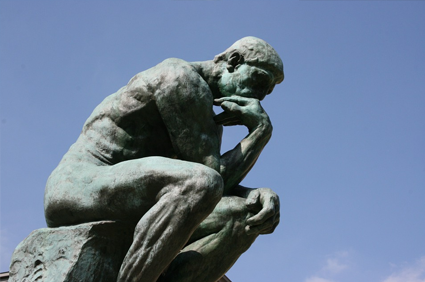Category: Against Naturalism

Philosophical Notes on the Underground: Three
“More than that: you say that then science itself will teach man (though this, to my mind, is already a luxury) that he really does not possess, and never did possess, either a will or a whim of his own; that he is, in fact, no more than a kind of piano key or organ … Continue reading Philosophical Notes on the Underground: Three

Philosophical Notes on the Underground: Two
I closed Note One by calling Underground Man “grouchy.”[1] That is an understatement. The man admits to being spiteful. He hates his neighbors, practices cruelty, and delights in the misfortune of others. He even claims to take pleasure in his own pain and bitterness, some of which is self-induced. For example: “I reached a point … Continue reading Philosophical Notes on the Underground: Two

Philosophical Notes on the Underground: One
“Meaningless! Meaningless!” says the Teacher. “Utterly meaningless! Everything is meaningless.” (Ecclesiastes 1:2) In Part 1 of Notes from Underground, Dostoyevsky’s Underground Man claims that consciousness is a disease.[1] In a loose sense, given certain assumptions, Underground Man makes a significant point. In a strict sense, however, he is wrong. Let me explain. First, we … Continue reading Philosophical Notes on the Underground: One

“The Ring of Truth”
What religion or worldview possesses the “Ring of Truth?” It is definitely not Islam or atheism! To be sure, this is not a deductive argument like the Kalam, Freethinking, or Ontological Arguments. I am simply encouraging readers to pay attention to their intuition. Although we cannot always trust our intuition, I contend that it is … Continue reading “The Ring of Truth”

Debating Determinism with Dillahunty
“Would you be interested in debating Matt Dillahunty?” That was the question I received in July of 2018, from one of the organizers for the Texas Baptist Unapologetics Conference. “Hmm . . . I don’t know,” was all I could say. I’d seen the scathing videos from Matt’s show, The Atheist Experience, and was aware … Continue reading Debating Determinism with Dillahunty

Is the Freethinking Argument Question Begging?
Question: Dear Tim, I will try to be as concise and brief as possible. I am a Christian and my question is concerning free will, determinism, Molinism and of course, with respect to your Argument of Freethinking against Naturalism. The Freethinking Argument Against Naturalism is formulated as follows: 1- If naturalism is true, the immaterial … Continue reading Is the Freethinking Argument Question Begging?

Captain America & the Moral Argument
The Marvel Movie franchise is arguably the most epic enterprise in movie history. The series has a number of stand-out characters, however, two stand out more than the others. In fact, their differences stand in such firm relief so as to culminate in a film where they were driven toe-to-toe whilst still harboring a slight underlying … Continue reading Captain America & the Moral Argument

Atheism Is Un-American
It is often purported that America was not founded on “religion” and that there is a “separation of church and state.” Thus, any discussion about God in public schools (for example) will swiftly be dealt with by the ACLU. But, since the ACLU stands for the *American* civil liberties union, it is pertinent to consider the … Continue reading Atheism Is Un-American

Was Quine Naturalizing Epistemology?
Abstract: Naturalized Epistemology is usually seen as Quine’s attempt to move epistemology away from philosophy to science. Some ill-advised Naturalists make use of Quine’s response to Carnap to justify the “end of Philosophy” (or at least Epistemology), and to affirm the primacy of Naturalistic Scientism over other disciplines. Nevertheless, I suggest that such readings of … Continue reading Was Quine Naturalizing Epistemology?

The Vanishing “I”
Question: Tim, you suggest that the determinist would probably think, or be committed to thinking, that either God or nature evaluates our beliefs (one of these is “the ‘thing’ evaluating and judging” our beliefs). But at the same time, you allow that on determinism we have mental states, presumably including these evaluative mental states (about … Continue reading The Vanishing “I”


